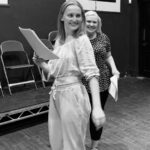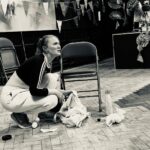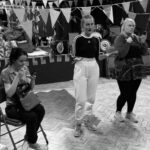The Space announces 2023 Autumn Season
The Space are proud to announce our Autumn programme from July to December 2023. We have an array of established and emerging companies and artists, which blends pirates, futurism, musicals, immersive theatre, ghosts and the very best new writing. We continue our livestream and on-demand service, meaning you can still enjoy the majority of our programme from the comforts of your own home!
Delving into the darkness of the past, we bring to light both historical fact and revel in historical inaccuracy. A Health to The Company, is a rollicking, epic romp that busts the myth of the ‘Golden Age of Piracy’. The Kaspar Hauser Experiment documents the true story of a man who claims to have been locked in a darked cell for 17 years. Oubliette casts facts aside to embrace magical melodic realism as a new camp and macabre musical.
We cast our eyes to the not-too-distant future with End of The World FM, as a lone radio host rages a one-man war to stay on the airwaves. The prospect of AI looms large: A solo traveller in space clings to life and artificial companionship in Adrift; A lone worker tinkers with mechanisms in an enormous block, with only their helper in Highrise.
We re-examine recent history with Teacher of The Year, transporting us to Liverpool, 1989 and the height of the poll tax protests. September explores the parallels of two 9/11s in both New York City, 2001 and Pinochet’s Chile, 1973. We become immersed in the memories of a childhood home in solo-immersive show Now Entering Ely, Nevada.
Closer to the present, we visit a Northern Town for a spooky Halloween experience as Alex and Maggie Go Ghost Hunting. Void takes us inside the minds of a struggling artist, battling anxiety as she seeks help and hopes to heal. While Transit and its migrant-led company explore the toxic cycles that marginalise artists in gripping new physical theatre.
The Space welcomes international artists from across near and far ponds: Three Things That Are Never Seen celebrates Old-Irish and Celtic mythology in a blend of music, movement and storytelling. From New York, The Pigeon & The Mouse is a cutting-edge contemporary dance piece of two lovers as they shelter in a post-nuclear American Civil War.
We continue our proud partnership with East 15 Acting School as we host a double bill of works: Bringing Greek Tragedy to the 90’s My Name is Cassandra combines movement and music to re-imagine the classic myth. In Friction Burn, a couple on the edge play love games in the style of Beckett and Pinter.
We also welcome the return of Rising Tides Theatre Company and their dedication to make work that addresses and responds to the climate crisis in their two-week festival Good COP, Bad COP 28: On Jackson’s first day as a drone pilot, he discovers the impossible – a real, living bee in Newbie. And more climate experts are paired with playwrights to create new pieces in Further Evidence.
We are proud to continue working with our Associate Company Mrs C’s Collective, who are presenting four new works from their writer’s collective programme in The Big Share: Nine Moons; Good Boy; Roobaroo & Routine. We are also hosting 5, free to attend, rehearsed readings through our own script development service, ScriptSpace.
The season will be launched, as is Space tradition, with a special Autumn Season Launch Night on Thursday 20th July, where each of our shows will share a preview of what’s to come, and a glass of something fizzy shared by all.
 ur fab actors re-familiarise with the script but also get stuck into the new bits.
ur fab actors re-familiarise with the script but also get stuck into the new bits. I pretty much only write comedy & am always looking for way to work with my director in crime, Coral (who also has comedic bones); we both want to make sure audiences have fun, escape & take a breather from reality in our pieces – fingers crossed we’ve achieved that with Hop!
I pretty much only write comedy & am always looking for way to work with my director in crime, Coral (who also has comedic bones); we both want to make sure audiences have fun, escape & take a breather from reality in our pieces – fingers crossed we’ve achieved that with Hop!